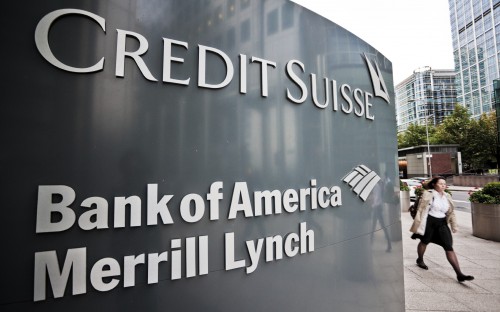The investment banking industry is stressed. Banks have been battered by onerous regulation, falling activity and political and public distrust for their role in the global financial crisis.
Investment bank profits have been squeezed, bonuses clawed back and images tarnished – diminishing their appeal to future recruits.
“The financial sector is not the easiest brand to sell these days because we are facing a big reputational challenge. The sector is less attractive,” says Roberto.
Global power houses, the likes of JPMorgan Chase and Goldman Sachs, have struggled to reach their pre-crisis returns. But through all the gloom there is a recruitment machine that keeps pumping, say experts. Investment banking as a career is down but not out.
“We have seen very consistent hiring numbers since 2008 with no decrease in demand for MBAs,” says Deirdre O’Donnell, associate director of the Career Development Office at the US' Tuck School of Business.
While some areas like fixed income, currencies and commodities trading has been cut down or handed over to undergraduates, there is growth in areas such as risk management, she says. “We see the most demand for investment bankers.”
Big investment banks continue to command huge numbers of applicants for their development schemes.
Morgan Stanley, for instance, received 90,000 applications for its summer analyst and associate positions last year. “There are numerous opportunities to succeed in an environment which is changing,” says Roberto. “It is a challenge that a lot of people still want to take [on].”
Goldman had 17,000 applicants for its 350 investment banking internships in 2013 – and last year for its analyst cohort the US investment bank had more than 40,000 candidates for less than 1,900 jobs.
But these employment programs are drawing larger numbers of younger recruits. Banks are now favouring undergraduates for many of their summer intern routes.
Sue Kline, senior director of the Career Development Office at MIT Sloan School of Management, says: “The trend for hiring undergraduates for roles such as sales and trading started during the first downturn in the market, and has continued.”
Alex Figueroa, an MBA recruiter and investment manager at Goldman, says that the bank’s recruitment style is to find people who are smart and then teach them what they need to know on the job.
“They’ll use their own initiative and the firm’s resources to launch their career,” he says. But he adds: “We’re not cookie-cutter in our approach.”
Most of the investment banking giants have developed specific routes to hire more senior recruits.
JPMorgan, the largest US bank by assets, runs a summer associate program specifically for MBA students.
Citigroup offers a full-time associate program that is geared towards MBAs and PhDs. Citi says it hires several hundred business school graduates each year for development programs.
In Europe it is much the same. Germany’s Deutsche Bank runs 8-10 week associate internships that are aimed at MBA students who already have significant levels of work experience.
UBS, Switzerland’s biggest bank, runs associate internships and full-time tracks for MBAs, and also has an emerging markets associate program in Switzerland that recruits business graduates.
Christelle Cuenin, assistant director of corporate partnership development at the business school INSEAD, says there has been an increase in investment banking jobs in Europe through summer associate programs.
“We have also observed more opportunities available to MBAs with previous experience in investment banking,” she says.
But there have been significant restructurings at many of the world’s big investment banks – from Royal Bank of Scotland to Credit Suisse – with further planned job cuts to come.
RBS had 100,000 investment bank employees in 2007; today just 18,000. And Deutsche Bank’s investment banking headcount has fallen by 12,000 over the same period.
Europe is a smaller market. UK-based Barclays and HSBC – which have around 20,000 employees in their investment banks – are dwarfed by bigger US rivals like JPMorgan, which has 51,000 employed, and Citigroup’s 47,000 investment bank personnel.
These companies are reining in their global ambitions, as stringent regulatory regimes make it harder for investment divisions to earn more than their costs of capital.
A recent report by KPMG, the professional services firm, highlighted the unintended consequences of the regulatory reform agenda – higher costs and reduced availability of financial services.
Jeremy Anderson, global head of financial services at KPMG, says there must be “balance between dealing with the crisis of yesterday” and “on building growth and jobs for tomorrow”.
One major attraction to investment banks has also been slightly diminished – the pay.
In a sign of the shifting balance of power in global capital markets, asset managers will overtake investment bankers on pay for the first time in 2016, according to New Financial, a think-tank.
New EU rules have also capped bonuses for senior bankers at twice the level of annual salary.
Werner Bonadurer, faculty director of the MSc in Finance program at W.P Carey School of Business, says: “More senior professionals tend to move out of the heavily regulated environment.”
MBAs are attracted by careers in investment banks because of compensation, but also by their training programs and exposure to major players and deals, according to Christelle at INSEAD.
There is much uncertainty in the investment banking industry but there remain pockets of growth, such as in risk and technology.
Joep Elemans, director of corporate relations at Rotterdam School of Management, says: “We find that investment banks are always interested in hiring talented MBA professionals who can offer added value.” He adds that boutique banks are recruiting less frequently than large lenders.
New blood is being brought in to add technology expertise. Banks face growing demand from customers who want to access services remotely through their smart phones.
Investment has been poured into IT, to improve real-time risk assessment of assets for risk management and regulatory reporting purposes, say recruiters.
Adam Jackson, director at City recruitment firm Astbury Marsden, says: “The digitization of banking sector processes is already having a profound impact on hiring activity at the large investment banks – and this is set to continue well into 2015 and beyond.”
Large banks are ultimately looking for a range of key skills in new recruits: leadership, initiative, quantitative ability, client-facing skills and industry knowledge, says Deirdre at Tuck.
For Goldman, previous experience in financial services is now less important, according to Alex.
“What we like to see is that whatever sort of endeavour you were undertaking prior to business school, we look for there to be a level of high achievement in that context,” he says.
So-called back office functions have grown while overall investment banking headcount has been slashed. Hardest hit have been the FICC – fixed income, commodities and currencies – functions.
At the world’s biggest banks front office jobs have been cut by 21% since 2010, according to London research firm Coalition.
Ironically it is regulation that has opened up one of the biggest areas of employment growth in global investment banking – compliance management.
A barrage of new rules has put a premium on specialist knowledge and experience in financial compliance.
BNP Paribas, France’s biggest bank, said last year that it had increased its compliance staff by 40% to 1,600. HSBC said it was recruiting 3,000 more compliance officers. And JPMorgan said it would hire a similar number to stem a flow of fines.
Within investment banking, compliance recruits can find roles in the control rooms that monitor communications, and higher up the careers ladder there is demand for hires with experience in strategy.
“The rules are becoming much stricter than they used to be. You need people who understand what the consequences are,” says Roberto at Morgan Stanley, who studied business administration at Milan's Bocconi University.
He adds that knowledge of these aspects is important: “This is where MBAs really stand out.”
RECAPTHA :
19
ae
cb
83








